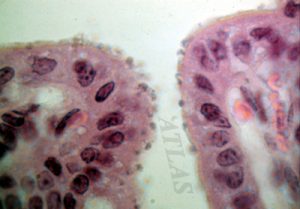 Cryptosporidium parvum is an important opportunistic parasite pathogen for immunocompromised individuals and a common cause of diarrhea in young children. Previous studies have identified a panel of RNA transcripts of very low protein-coding potential in C. parvum.
Cryptosporidium parvum is an important opportunistic parasite pathogen for immunocompromised individuals and a common cause of diarrhea in young children. Previous studies have identified a panel of RNA transcripts of very low protein-coding potential in C. parvum.
Using an in vitro model of human intestinal cryptosporidiosis, we report here that some of these C. parvum RNA transcripts were selectively delivered into the nuclei of host epithelial cells during C. parvum infection. Nuclear delivery of several such parasitic RNAs, including Cdg7_FLc_0990, involved heat-shock protein 70-mediated nuclear importing mechanism. Overexpression of Cdg7_FLc_0990 in intestinal epithelial cells resulted in significant changes in expression levels of specific genes, with significant overlapping with alterations in gene expression profile detected in host cells following C. parvum infection.
Our data demonstrate that C. parvum transcripts of low protein-coding potential are selectively delivered into epithelial cells during infection and may modulate gene transcription in infected host cells.
Delivery of parasite RNA transcripts into infected epithelial cells during Cryptosporidium infection and its potential impact on host gene transcription
J Infect Dis. (2016) doi: 10.1093/infdis/jiw607
Yang Wang, Ai-Yu Gong, Shibin Ma, Xiqiang Chen, Yan Li, Chun-Jen Su, Dana Norall, Jing Chen, Juliane K. Strauss-Soukup, Xian-Ming Chen
http://jid.oxfordjournals.org/content/early/2016/12/21/infdis.jiw607.abstract
